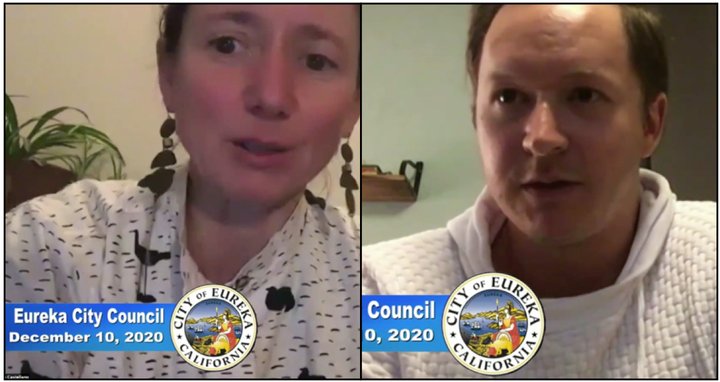
Eureka City Councilmembers Leslie Castellano (left) and Austin Allison | Screenshots from Eureka City Council meeting held vis Zoom
After hours of deliberation and hearing from over 60 public speakers during a special meeting Thursday night, the Eureka City Council voted to temporarily ban syringe exchange programs (SEPs) in the city until it can draft new rules to regulate them.
The vote was 3-2, with Councilmembers Leslie Castellano and Natalie Arroyo dissenting, to repeal a resolution adopted by the council in 2016 that supports the operation of SEPs and replace it with a new resolution that prohibits SEPs until the city can establish a syringe exchange ordinance. The temporary ban becomes effective on Dec. 16.
The decision follows two council meetings held last week, during which the council failed to come to an agreement with the Humboldt Area Center for Harm Reduction (HACHR), which operates the only city-governed SEP in Eureka. Since its inception in 2016, HACHR has been a lightning rod for controversy, with many residents complaining about the nonprofit’s syringe exchange operated out of its Third Street facility.
Under the new resolution, HACHR will still be allowed to provide its other services, including overdose prevention and free HIV and Hepatitis C testing, and the county SEP operated by the Department of Health and Human Services (DHHS) will still be able to operate within the City of Eureka.
Reached by the Outpost this morning, Eureka City Manager Miles Slattery said that city staff is already working on drafting the SEP ordinance, which will then go to a consultant for a California Environmental Quality Act (CEQA) review before it can be adopted by council. Slattery added that DHHS has agreed to temporarily extend its syringe exchange hours, but he does not know yet what the additional hours will be.
Even with the DHHS continuing to offer syringe exchange, HACHR staff says that the council’s decision to temporarily prohibit SEPs will have a devastating effect on the population the program serves.
“Access to syringe services saves lives,” HACHR posted on its Facebook page. “Restricting access to syringe services is a public health emergency in the making. This action will impact our community at unknowable levels for an unforeseeable amounts of time - via an increase in HIV and HCV transmission, an increase in utilization of emergency medical services DURING A PANDEMIC and due to use of non-sterile equipment, including abscesses, blood infections including MRSA and other forms of staph, cellulitis, clotting disorders, and sepsis.”
###
PREVIOUSLY:
- City of Eureka Announces Opposition to HACHR Recertification, Releases Lengthy Report Chronicling Months-Long Undercover Surveillance
- HACHR Responds to City of Eureka Letter Opposing State Reauthorization
- HACHR Releases Statement Detailing Steps It Plans to Take Moving Forward
- Eureka City Council Approves Letter Opposing the Reauthorization of HACHR’S Syringe Exchange Program
- State Reauthorizes HACHR’s Syringe Exchange Program, But Gives Eureka More Control
- Eureka City Council Votes Down Proposed HACHR Agreement, But Will Reconsider Vote Tonight
- Eureka City Council to Consider Temporary Ban on Syringe Exhange Programs, After Rejecting Proposed HACHR Agreement
CLICK TO MANAGE